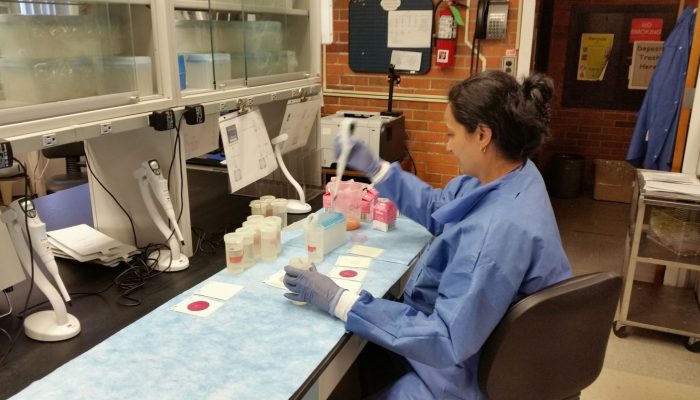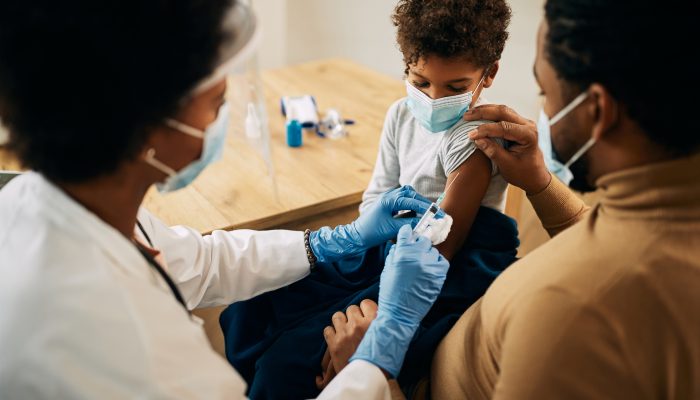A lot of the work that goes into protecting the public’s health occurs behind the scenes and out of the spotlight. Despite its low profile, Philadelphia’s public health lab is just such an essential part of the Department of Public Health.
Philadelphia has had a public health lab since 1894, when the City created the Division of Pathology, Bacteriology, and Disinfection, working right in City Hall. In those early days of the new science of bacteriology, the lab focused on two main killers of the day, diphtheria and tuberculosis, and it produced antitoxin for diphtheria. Ever since then, our lab has been providing crucial information to public health staff on what invading species are circulating in the city and how we can keep them at bay.
Today, the techs test samples of blood for signs of organisms like HIV, syphilis, and influenza. They test food for pathogens and swimming pool water for bacteria. They dissect the brains of bats to test them for rabies. And when an outbreak flares, they test just about any other specimen our Communicable Disease investigators bring in for organisms that might be causing people to get sick.
Just about every state and big city health department has a laboratory, but ours is different from most because it also serves our primary care clinics. Each year our techs do thousands of blood cell counts and blood chemistries, which help the doctors and nurses in our primary care clinics take care of patients. They test our children for lead poisoning. They test blood sugars for adults with diabetes. And they test many thousands of adults for HIV infection, gonorrhea, and chlamydia so that those who are infected can quickly get treated.
The lab is a fascinating mix of the traditional and new. Inside you’ll see culture plates and flasks that would fit in a lab from a century ago, next to high-tech computers that run HIV tests and blood chemistries. In the end, it’s not the technology that matters but whether we get the correct information to make smart decisions. For our clinics, those decisions are about caring for individual patients. For the rest of the agency, those decisions are about protecting the entire city.
Public health threats will always change. Not long ago, the crisis was HIV. Then bird flu. Today we worry about Ebola and Zika. We’ll always need a laboratory, not just for today’s problems, but also for the health risks that will crop up tomorrow.
Each section of Philadelphia’s public health lab focuses on a specific area of analysis:
- The Clinical Chemistry section of the lab measures the level of chemical compounds in the blood and body fluids. The most common substances measured include: hormones, enzymes, lipids, electrolytes, glucose, and proteins. The Clinical Chemistry section also performs blood lead testing for the Lead and Healthy Homes Program.
- The Clinical Hematology section of the lab identifies and studies cells found in urine and other body fluids. Other testing includes: complete blood counts, erythrocyte sedimentation rates, sickle cell screening, and urinalysis testing for chemical and cellular components. The section also screens for G-6-PD deficiency, the most common enzyme deficiency in the world.
- The Immunology section of the lab performs diagnostic and screening tests for syphilis. Physicians use these results to treat infected patients and to reach out to potentially infected sexual partners to help prevent the spread of the disease. The Immunology section also performs rabies testing. Any animal that bites a human in Philadelphia is tested. Rabies can be fatal to humans if not treated. All cases of human bites must be reported to the Division of Disease Control.
- The Microbiology section of the lab performs testing on patient samples to determine infection or disease. The identification and sensitivity of organisms are pertinent to proper treatment regimens. Urine, throat, wound, and fungus cultures are tested. Testing of the patient sample helps to determine the most appropriate antibiotic to combat the infection. The section also uses NAAT amplification testing for sexually transmitted diseases like chlamydia and gonorrhea.
- The Special Microbiology section of the lab includes four different areas:
- Mycobacteriology provides direct microscopic examination, culture and drug susceptibility testing for the primary identification of Mycobacterium. State law requires clinical laboratories to submit isolates of Mycobacterium tuberculosis to the public health laboratory for confirmation and drug susceptibility testing.
- Molecular Testing provides faster, more accurate analysis of bacterial and viral samples. This area is constantly growing and adding testing to its menu, which includes: influenza, norovirus, Bordatella pertussis, group B streptococcus, herpes simplex virus, complete gastrointestinal and respiratory panels.
- Environmental Food and Milk Microbiology isolates and identifies pathogens in food products. The public health laboratory works with Environmental Health Services and the Division of Disease Control to investigate food-borne illnesses.
- Environmental Water Microbiology provides bacteriological analysis of recreational pool water. Total coliform, E. Coli and heterophle plate counts are performed on each sample collected.
- The Rabies section of the lab identifies the presence of rabies virus in suspected infected animals involved in human exposure. The lab receives samples from the ASPCA, ACCT Philly, PDPH’s Vector Control program, and some private veterinarians. Staff test a variety of samples that include, but are not limited to: bats, cats, dogs, opossums, raccoons and foxes. A necropsy is performed and brain tissue is tested for the presence of rabies virus. If a positive test is identified, staff notifies the Division of Disease Control immediately to begin an appropriate treatment regimen.
Career Opportunities
The Public Health Laboratory hires Medical Technologists with ASCP certification. If you are interested in being considered, please forward your resume to kerry.buchs@phila.gov.
Internship Opportunities
The Public Health Laboratory has internships available during the summer months for students in their junior or senior year of college. To apply, contact kerry.buchs@phila.gov.




